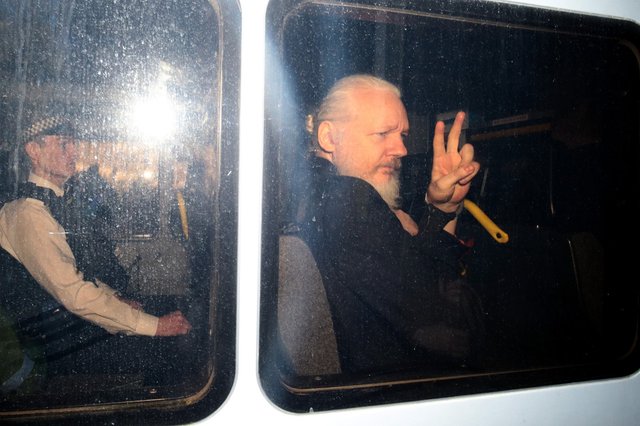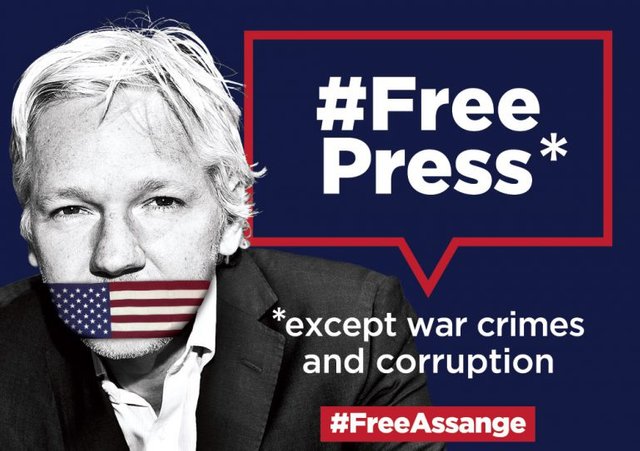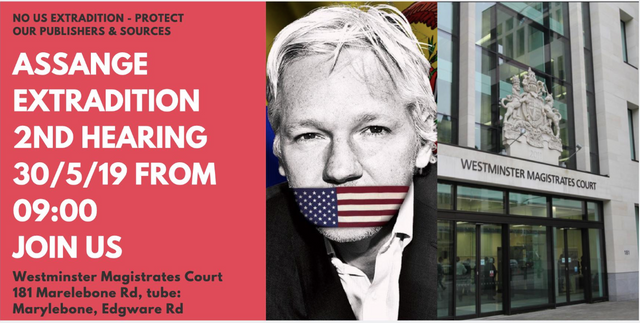Assange Indicted Under Espionage Act In Unprecedented Blow To Press Freedom

This article is my own intellectual property. Image via Jack Taylor/Getty Images.
The US Justice Department announced 17 additional criminal charges in a superseding indictment against WikiLeaks founder Julian Assange on Thursday. The additional charges against raise the possibility that he could face the death penalty if extradited to the United States.
At this time is remains under the purview of the UK Home Secretary Sajid Javid to consent to Assange’s extradition to the US, both directly from the UK and in the case of onward extradition to the US from Sweden.
Reuters reports the Justice Department’s allegation that Assange “unlawfully published the names of classified sources and conspired with and assisted ex-Army intelligence analyst Chelsea Manning in obtaining access to classified information.” The New York Times described the situation as a “novel case that raises profound First Amendment issues.”
WikiLeaks published a response to the latest charges via Twitter, writing: “The Department of Justice wants to imprison Assange for crimes allegedly committed outside of the United States. This extraterritorial application of US law is explicit throughout the indictment… thereby classifying any territory in the world as subject to US law… In response to the unprecedented espionage charges filed against Julian Assange today, WikiLeaks editor-in-chief Kristinn Hrafnsson declared:
“This is the evil of lawlessness in its purest form. With the indictment, the ‘leader of the free world’ dismisses the First Amendment — hailed as a model of press freedom around the world — and launches a blatant extraterritorial assault outside its borders, attacking basic principles of democracy in Europe and the rest of the world.”
WikiLeaks went on to write that the indictment “carries serious implications for WikiLeaks publishing partners, numbering over one hundred across the globe, including The New York Times, The Telegraph and The Guardian, who collaborated on the publications and may now face co-dependent charges.”
WikiLeaks concluded: “The final decision on Assange’s extradition rests with the UK Home Secretary, who is now under enormous pressure to protect the rights of the free press in the UK and elsewhere. Press rights advocates have unanimously argued that Assange’s prosecution under the Espionage Act is incompatible with basic democratic principles. This is the gravest attack on press freedoms of the century.” [Emphasis added]
Julian Assange’s attorney Barry Pollack responded to the news, saying: “Today the government charged Julian Assange under the Espionage Act for encouraging sources to provide him truthful information and for publishing that information. The fig leaf that this is merely about alleged computer hacking has been removed. These unprecedented charges demonstrate the gravity of the threat the criminal prosecution of Julian Assange poses to all journalists in their endeavor to inform the public about actions that have taken by the U.S. government.”
Journalists, press freedom organizations and other figures were quick to respond to the additional charges laid against Assange. Award-winning journalist and filmmaker John Pilger wrote via social media:
"The war on Julian Assange is now a war on all. Eighteen absurd charges including espionage send a burning message to every journalist, every publisher. The target today is Assange. Tomorrow it will be you on the New York Times, you on the BBC. Modern fascism is breaking cover."
“Assange's motives or membership in an undefinable "journalist" club are irrelevant to the very dangerous step that the Trump DOJ took today. We'll now find out whether publishing information (as well as seeking and obtaining it) may constitutionally be charged as espionage,” Tweeted Pulitzer-prize winning journalist Barton Gellman.
New York Times indicated that a “Justice Department official who stayed behind to answer questions on the condition that he would not be named would not address any about how most of the basic actions the indictment deemed felonies by Mr. Assange differed in a legally meaningful way from ordinary national-security investigative journalism — working with sources to obtain secret information of news value and publishing that information without the government’s permission.”
The ACLU responded, writing: “For the first time in the history of our country, the government has brought criminal charges under the Espionage Act against a publisher for the publication of truthful information. This is a direct assault on the First Amendment. These charges are an extraordinary escalation of the Trump administration's attacks on journalism, establishing a dangerous precedent that can be used to target all news organizations that hold the government accountable by publishing its secrets.”

Image Credit: Somerset Bean
The ACLU added: “The charges against Assange are equally dangerous for US journalists who uncover the secrets of other nations. If the US can prosecute a foreign publisher for violating our secrecy laws, there’s nothing preventing China, or Russia, from doing the same.”
In 2010, Consortium News founder and investigative journalist Robert Parry described Assange’s conduct surrounding the material supplied by Chelsea Manning as identical to the methods traditionally used by investigative journalists, including himself.
Parry wrote: “Such behavior – whether cajoling a nervous government official to expose a secret or exploiting some unauthorized access to classified material – is part of what an investigative journalist does in covering national security abuses. The traditional rule of thumb has been that it’s the government’s job to hide the secrets and a reporter’s job to uncover them.”
Yale Fellow and Assistant Professor with the Kline School of Law Hannah Bloch-Wehba echoed these sentiments, writing via Twitter: “The relationship between Assange and Manning is not readily distinguishable from many reporter-source relationships cultivated over a period of time.”
Bloch-Weba continued: “This suggests that liability might be predicated on relationships or activities that look an awful lot like newsgathering.”
Shortly before being re-imprisoned for her refusal to testify before a grand jury impaneled against Assange last week, Chelsea Manning also told the press that the Trump Administration “clearly wants to go after journalists” and predicted that the Justice Department would prosecute reporters covering national security and other “disruptive” topics.
Chelsea Manning and her lawyer published statements via the Sparrow Project hours after the additional charges were announced. Manning stated: "It’s telling that the government appears to have already obtained this indictment before my contempt hearing last week. This administration describes the press as the opposition party and an enemy of the people. Today, they use the law as a sword, and have shown their willingness to bring the full power of the state against the very institution intended to shield us from such excesses."
Moira Meltzer-Cohen, Manning’s attorney wrote: “Up until now the Department Of Justice has been reticent to actually indict publishers for work implicating matters of national security, because the first amendment rights of the press and public are so constitutionally valuable. This signals a real shift, and sets a new precedent for the federal government’s desire to chill and even punish the vigorous exercise of the free press.”
“Put simply, these unprecedented charges against Julian Assange and WikiLeaks are the most significant and terrifying threat to the First Amendment in the 21st century,” said Trevor Timm, executive director of the Freedom of the Press Foundation. Unfortunately, the Freedom of the Press Foundation stopped processing donations towards WikiLeaks in December 2107, despite being reportedly "created in response to the banking blockade against WikiLeaks." At the time of writing, Timm has not announced any plan to resume processing WikiLeaks donations in future.
Assange was initially charged with illegally accessing a government computer shortly after his April 11 expulsion from the Ecuadorian Embassy and simultaneous arrest by UK authorities. The allegation against Assange was often misreported as hacking into a government computer when in fact, the material forming the basis of the indictment had been public since 2011, and showed that Assange had tried to aid Manning in preserving anonymity while accessing material she had legally sanctioned access to at the time.

Image via Greekemmy, Twitter.
Assange’s first extradition hearing is set take place on May 30th, and the US must reveal all charges against Assange by June 14th. Assange supporters will protest the May 30th hearing from 9:00 am outside the Westminster Magistrates Court.
Truth is treason in an empire of lies. -Ron Paul
Great quote.
I always believed a huge part of the agenda here, and I am in zero doubt it is indeed an agenda, was to send a clear message to journalists a few rounds fired just above the heads as it were to never under any circumstances step away from the official narrative.
The real message of course that next time it may be a shelling or mortar attack, metaphorical or otherwise...
Democracy, freedom and the so-called-power of the many has taken quite a severe battering over the last few years.
It is high time 'we the people' made our voices heard again... I mean really make ourselves heard!
Sad day
Posted using Partiko iOS
USA; freedumb all the way backwards from Zionism to Assange...